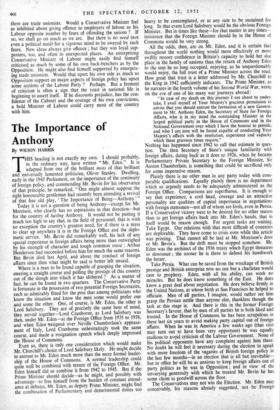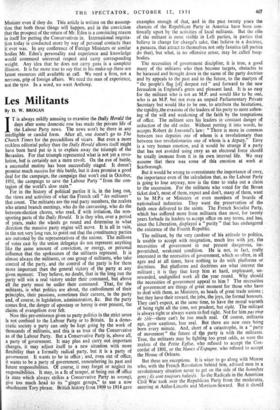The Importance of Anthony
By WILSON HARRIS THIS heading is not exactly my own. I should probably, in the ordinary way, have written " Mr. Eden." It is adapted from one of the brilliant mots of -that brilliant and universally lamented politician, Oliver Stanley. Dwelling, early in the 1945 Parliament, on the importance of the continuity of foreign policy, and commending Mr. Bevin for his observance of that principle, he remarked, " One might almost suppose the right honourable gentleman had recently been attending a revival of that fine old play, ' The Importance of Being—Anthony.' " Today it is not a question of being Anthony—except for Mr. Morrison, who clearly has no aspirations in that direction—but for the country of having Anthony. It would not be putting it much too high to say that, in the field of personnel, that is with no exception the country's greatest need, for if there is a mess to clear up anywhere it is in the Foreign Office and the diplo- matic service. Mr. Bevin did remarkably well, his lack of any special experience in foreign affairs being more than outweighed by his strength of character and tough common sense ; Arthur Henderson had succeeded before him for much the same reasons. But Bevin died last April, and about the conduct of foreign affairs since then what might be said is better left unsaid. Where is a man to be found capable of grasping the situation, steering a straight course and pulling the prestige of this country out of the slough into which it has slithered ? As a matter of fact, he can be found in two quarters. The Conservative Party is fortunate in the possession of two potential Foreign Secretaries, each so admirably fitted for the post that among politicians who know the situation and know the men some would prefer one and some the other. One, -of course, is Mr. Eden, the other is Lord Salisbury. They are of precisely the same bent of mind, they served together—Lord Cranborne, as Lord Salisbury was then, under Mr. Eden—at the Foreign Office from 1935 to 1938, and when Eden 4resigned over Neville Chamberlain:s appease- ment of Italy, Lord Cranbome unhesitatingly took the same course, and made a resignation speech which deeply impressed the House of Commons.
Even so, there is only one consideration which would make Mr. Churchill's choice of Lord Salisbury likely. He might decide to entrust to Mr. Eden much more than the mere formal leader- ship of the House of Commons. A normal leadership could quite well be combined with tenure of the Foreign Office. Mr. Eden himself did so combine it from 1942 to 1945. But if the Prime Minister should decide—as he might, and possibly with advantage—to free himself from the burden of constant attend- ance at debates, Mr. Eden, as -deputy Prime Minister, might find the combination of Parliamentary and departmental duties too heavy to be contemplated, or at any rate to be sustained for long. In that event Lord Salisbury would be the obvious Foreign Minister. But in times like these—for that matter in any times— insistence that the Foreign Minister should be in the House of Commons would be very strong.
All the odds, then, are on Mr. Eden, and it is certain that throughout the world nothing would more effectively or more swiftly restore confidence in Britain's capacity to hold her due place in the family of nations than the return of Anthony Eden to the seat he- so long occupied, enjoying, as he unquestionably would enjoy, the full trust of a Prime Minister across the road. How great that trust is a letter addressed by Mr. Churchill to the King in 1942 sufficiently indicates. The Prime Minister, as he narrates in the fourth volume of his Second World War, wrote on the eve of one of his many war journeys abroad : " In case of my death on this journey. I am about to under- take, I avail myself of Your Majesty's gracious permission to advise that you should entrust the formation of a new Govern- ment to Mr. Anthony Eden, the Secretary of State for Foreign Affairs, who is in my mind the outstanding Miniiter in the largest political party in the House of Commons and in the National Government over which I have the honour to preside, and who I am sure will be fourid capable of conducting Your Majesty's affairs with the resolution, experience and capacity which these grievous times require." Nothing has happened since 1942 to call that estimate in ques- tion. The then Secretary of State's unique familiarity with foreign affairs, dating back -as it does to 1926, when he became Parliamentary Private Secretary to the Foreign Minister, Sir Austen Chamberlain, is something that could be sacrificed only for some imperative reason.
Plainly there is no other man in any party today with com- parable qualifications. Equally plainly there is no department which so urgently needs to be Adequately administered as the Foreign Office. Comparisons are superfluous. It is enoughto say that experience, a cool head, courage and an attractive personality are qualities of capital importance in negotiations with foreign statesmen—not all of whom are fools, even in Persia. If a Conservative victory were to be desired for no other reason than to get foreign affairs back into Mr. Eden's hands, that in itself would be reason enough. For urgent tasks are waiting. Take Egypt. Our relations with that most difficult of countries are deplorable. They have come to crisis even while this article was printing. That cannot all be laid at Mr. Morrison's door or Mr. Bevin's. But the drift must be stopped somehow. Mr. Eden was the architect of the 1936 treaty which Egypt threatens to denounce ; the sooner he is there to defend his handiwork the better.
Take Persia. What can be saved from the wreckage of British prestige and British enterprise now no one but a charlatan would care to prophesy. Eden, with all his ability, can work no miracles. But he. does know something of the East. He does know a great deal about negotiation. He does believe firmly in the United Nations, at whose birth at San Francisco he helped to officiate. Men of all parties, I imagine, would rather see him grasp the Persian nettle than anyone else, thankless though the task at this stage is. And there is this in the former Foreign Secretary's favour, that by men of all parties he is both liked and trusted. In the House of Commons he has been scrupulous in these last six years to avoid making party capital out of foreign affairs. When he was in America a few weeks ago (that visit may turn out to have been very opportune) he was equally studious to avoid criticism of the Labour Government. None of his political opponents have any complaint against him there. No doubt he will feel it necessary during the election to speak with more freedom of the vagaries of British foreign policy in the last few months—in an election that is all but inevitable— but in office he will be as anxious to keep foreign affairs out of party politics as he was in Opposition ; and in view of the unvarying generosity with which he treated Mr. Bevin he has some claim to goodwill across the floor. The Conservatives may not win the Election. Mr. Eden may conceivably, for reasons already suggested. not be Foreign Minister even if they do. This article is written on the assump- tion that both those things will happen, and in the conviction that the prospect of the return of Mr. Eden is a convincing reason in itself for putting the Conservatives in. International negotia- tion today is conducted more by way of personal contacts than it ever was.- In any conference of Foreign Ministers or similar bodies Mr. Eden's personality and experience and knowledge would command universal respect and carry corresponding weight. Any idea that he does not carry guns is a complete illusion. It is far more true to say that in his make-up there are latent resources still available at call. We need a firm, not a nervous, grip of foreign affairs. We need the man of experience, not the tyro. In a word, we want Anthony.



































 Previous page
Previous page